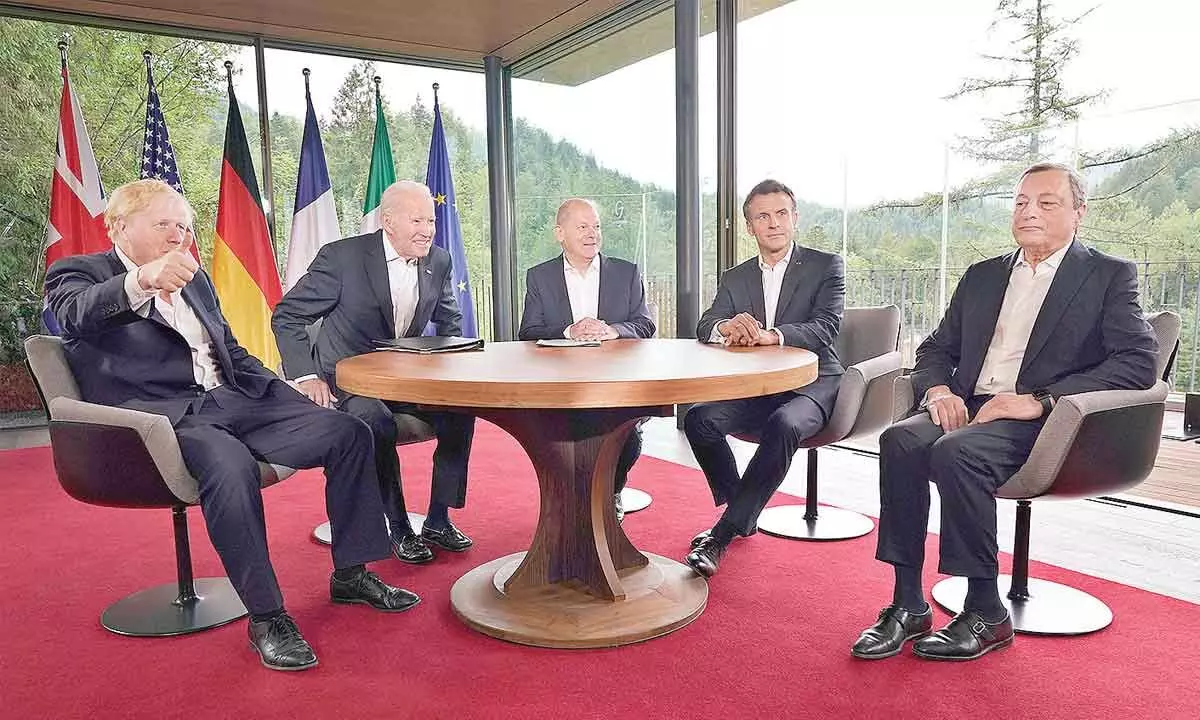Live
- Improvement in Sriteja's Health Condition; Ventilator Removed and Liquid Diet Administered
- Former SC judge V. Ramasubramanian appointed as NHRC Chairperson
- Shyam Benegal: A true inspiration for aspiring film-makers
- Heavy snow forecast in Japan through Tuesday
- Legendary film-maker Shyam Benegal is no more
- Hackers steal over $12.7 billion in over 1,000 crypto heists to date
- BGT: 'Rohit is short of confidence with self-doubts', opines Manjrekar
- Gold gains 30 pc in 2024, silver 35 pc up on COMEX this year: MOFSL
- Delhi HC dismisses anticipatory bail plea of ex-IAS trainee officer Puja Khedkar
- Untouched Goa Beaches You Must Visit in January
Just In
G7 vows to drive up costs for Russia over Ukraine war


G7 leaders from left, British PM Boris Johnson, US President Joe Biden, German Chancellor Olaf Scholz, French President Emmanuel Macron and Italy PM Mario Draghi meet on the sidelines of G7 summit in Elmau, Germany on Tuesday
Decries Putin’s brutal assault on civilian population
Elmau: Western leaders ended the three-day G7 summit in Germany promising to increase the economic and political costs to Vladimir Putin and his regime of Russia's war in Ukraine.
The German chancellor and chair of the G7, Olaf Scholz, made the vow at a closing press conference in which he said the group were united and unbreakable, adding: "It is important to stand together for this over the long distance, which will certainly be necessary."
With the summit taking place at the same time as an attack on a kindergarten in the Ukrainian capital, Kyiv, and a missile strike on a shopping centre in Kremenchuk that killed at least 18 people, the leaders will hope the summit demonstrated the resolve, unity and practicality required to weaken the Russian President's war machine. Scholz said the rest of the world was watching Putin's brutal assault on the civilian population of Ukraine.
However, disagreements at the summit continued right until the end on the issue of finding a way to reduce the flow of cash into the Kremlin from western consumption of Russian energy. Germany fears that a cap on the price of oil or gas would lead to a complete cut-off of Russian energy supplies and European industrial meltdown. Others, especially the Americans, say the plan is workable.
The G7 said it would "take immediate action to secure energy supply and reduce price surges driven by extraordinary market conditions, including by exploring additional measures such as price caps". The wording allows further work to be undertaken on complementary US ideas for an oil price cap and an Italian plan for a gas price cap. Russia has already warned of retaliation if the west tries to manipulate energy prices to below the market level.
The G7 leaders said they were moved by the video discussion with Ukrainian President Volodymyr Zelensky in which he called on the group to help end the war by the winter, reflecting the attrition that Ukrainian soldiers are facing and a belief that heavier weaponry can help regain the ground that is steadily being lost in the Donbas. One G7 leader said: "Zelensky showed courage and realism about what lies ahead."
Boris Johnson, who entered the summit warning that Russia is poised to annex more Ukrainian land if the status quo in the balance of forces continues, emerged slightly more optimistic that those who had been calling for an early settlement have been quietened, and that it has been accepted a sustained battle lies ahead.
French President Emmanuel Macron – sometimes seen as the man most committed to a future long-term relationship with Russia – said the G7 would support Ukraine for as long as necessary. He was unconstrained in his criticism of Russian attacks on civilians, saying the strike on the Kremenchuk shopping centre was a war crime and that Russia must not win the war.

© 2024 Hyderabad Media House Limited/The Hans India. All rights reserved. Powered by hocalwire.com






